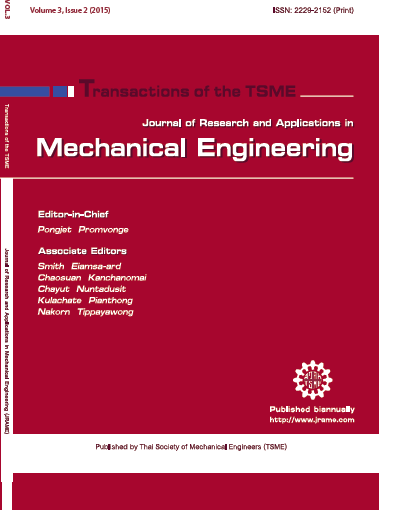Optimal synthesis of four-bar linkage path generation through evolutionary computation
Main Article Content
Abstract
This paper presents the optimization of path generating of four-bar linkages using evolution algorithms (EAs). The design problem is assigned to minimize the error between desired and obtained coupler curves. Such mechanism synthesis is sometimes called dimensional analysis, which has the design variables as link lengths and other parameters. In this work, three evolutionary algorithms namely differential evolution (DE), hybrid population-based incremental learning and differential evolution (PBIL-DE) and adaptive differential evolution with optional external archive (JADE) are applied for finding the solutions. The results show that DE and JADE are the best methods for synthesizing the path generating of a four-bar linkage.
Article Details
This work is licensed under a Creative Commons Attribution-NonCommercial-ShareAlike 4.0 International License.
References
[2] Cabrera, J. A., Nadal, F., Muñoz, J.P. and Simon, A. Multiobjective constrained optimal synthesis of planar mechanisms using a new evolutionary algorithm, Mechanism and Machine Theory, Vol. 42(7), 2007, pp.791-806.
[3] Acharyya, S. K. and Mandal, M. Performance of EAs for four-bar linkage synthesis, Mechanism and Machine Theory, Vol. 44(9), 2009, pp.1784-1794.
[4] Al-Dwairi, A.F., Dweiri, F.T. and Ashour, O.M. A novice-centered decision-support system for type synthesis of function-generation mechanisms, Mechanism and Machine Theory, Vol. 45(9), 2010, pp. 1252-1268.
[5] Cabrera, J.A., Ortiz, A., Nadal, F. and Castillo, J.J. An evolutionary algorithm for path synthesis of mechanisms, Mechanism and Machine Theory, Vol. 46(2), 2011, pp. 127-141.
[6] Heo, J.C. and Yoon, G.H. Size and configuration syntheses of rigid-link mechanisms with multiple rotary actuators using the constraint force design method, Mechanism and Machine Theory, Vol. 64, 2013, pp.18-38.
[7] Chanekar, P.V. and Ghosal, A. Optimal synthesis of adjustable planar four-bar crank-rocker type mechanisms for approximate multi-path generation, Mechanism and Machine Theory, Vol. 69, 2013, pp. 263-277.
[8] Storn, R.M. and Price, K.V. Differential evolution-a simple and efficient heuristic for global optimization over continuous spaces, Journal of Global Optimization, Vol. 11, 1997, pp. 341-359.
[9] Zhang, J. and Sanderson, A.C. JADE: adaptive differential evolution with optional external archive, IEEE Transaction on Evolution Computation, Vol. 13(5), 2009, pp. 945-958.
[10] Baluja, S. Population-based incremental learning: a method for integrating genetic search based function optimization and competitive learning, Technical ReportCMU_CS_95_163, 1994, Carnegie Mellon University.
[11] Pholdee, N. and Bureerat, S. Hybridisation of real-code population-based incremental learning and differential evolution for multi-objective design of trusses, Information Science, Vol. 223 (2013), pp. 136-152.



